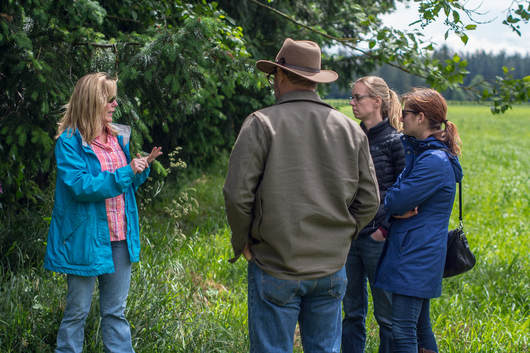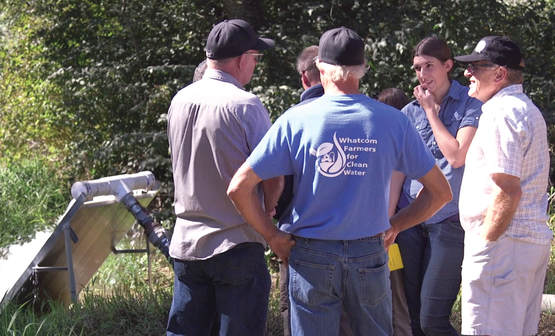 Whatcom County dairy farmer, university professor and agroecologist Karen Steensma (left) explains environmental protection measures she's implemented on her Lynden-area farm. Whatcom County dairy farmer, university professor and agroecologist Karen Steensma (left) explains environmental protection measures she's implemented on her Lynden-area farm. For generations, Whatcom County's family farmers have taken stewardship of the land seriously. In recent years, local family farmers have led hundreds of projects to restore streams, conserve water, protect salmon and so much more. Here are some of the highlights:
And these are just the highlights! There are many more stories that haven't been told, and many family farmers who are doing things big and small each day to protect the environment around them. If you know of more stories we should be sharing with the community, please email Dillon Honcoop at [email protected].
0 Comments
 Marty Maberry, longtime leader in the effort to improve conditions on Bertrand Creek, explains the project's benefits while water flows from the custom-designed aerator in the the background. Marty Maberry, longtime leader in the effort to improve conditions on Bertrand Creek, explains the project's benefits while water flows from the custom-designed aerator in the the background. The Bertrand is a relatively small stream that originates in Canada. For many years farmers near the stream had legal rights to withdraw irrigation water directly from the stream. Irrigation was needed at the driest times of the summer at the same time that the natural flows were lowest. The result was a decline in flow to the point of harming fish. In 2004, farmers recognized the problem and formed the Bertrand Watershed Improvement District. This was the first of six farmer-led government entities formed to address water issues. Many farmers were already working hard at conserving water. Marty Maberry, co-owner of Maberry Packing, said the micro-irrigation now used by almost all berry farmers reduced the withdrawals for irrigation by half per acre. But this alone did not solve the problem of low flows. From 2010 to 2016 a number of the farmers were approved to pull their irrigation water from nearby wells instead of the stream. This made a massive difference in stream flows, but at the same time, farmers were working on an innovative idea to increase flow even more: augmentation. This involved pumping water from a well into the creek at the time of lowest flow. They applied for the groundwater permit from the Washington Department of Ecology, and after over two years of delays, were finally granted approval. As the water flowed into the stream, a newly-designed structure aerated the water, refreshing it with a higher oxygen content and new life. Measurements confirmed that the flow had increased all the way to the river. “Farmers understand this is something we need to do,” said Maberry. “Habitat is only one factor affecting fish, but it is one that as farmers we can address. This shows we understand the need for stream flow, for habitat and we respect and support tribal treaty rights.” According to Maberry, the Bertrand augmentation project is just a start. “We see many opportunities to improve habitat with this kind of farmer-led approach,” he said. “But we also look for more support from our government leaders including tribal leaders for help in securing the long delayed water rights that will allow us to continue to farm.” The farming community is eager to keep the Bertrand stream a healthy place for local salmon and trout to thrive, something that may not have been possible had they not taken action. |
AuthorWrite something about yourself. No need to be fancy, just an overview. Archives
November 2023
Categories
All
|
 RSS Feed
RSS Feed